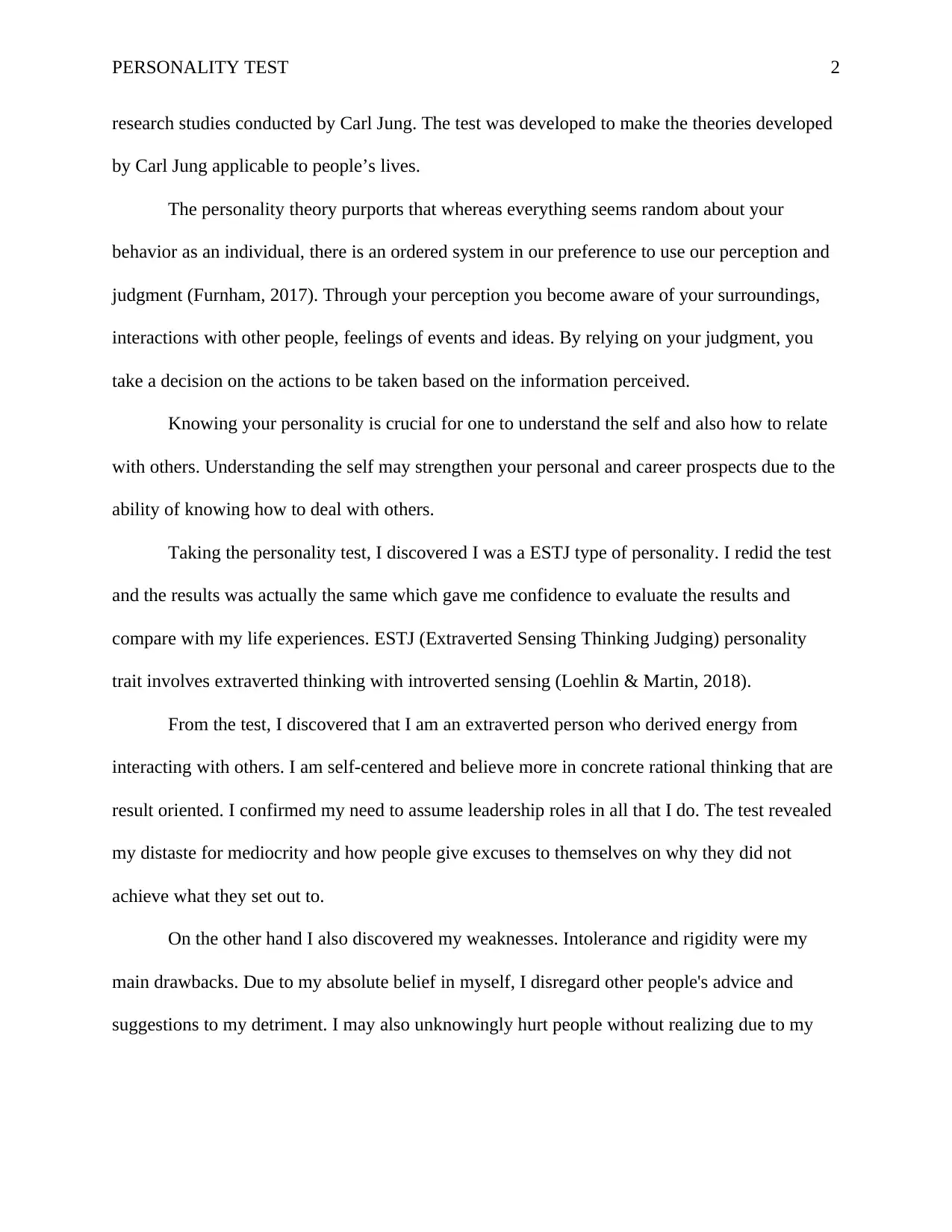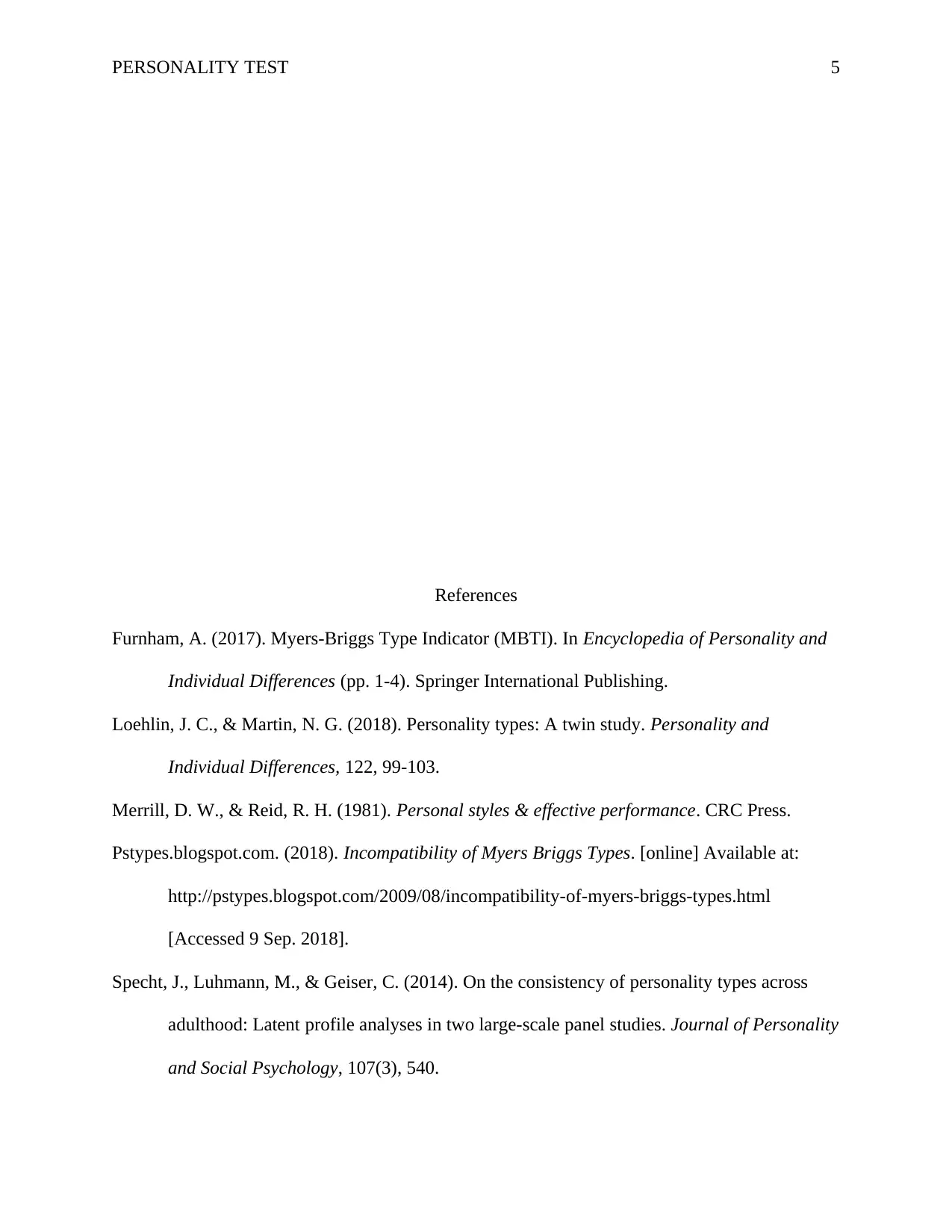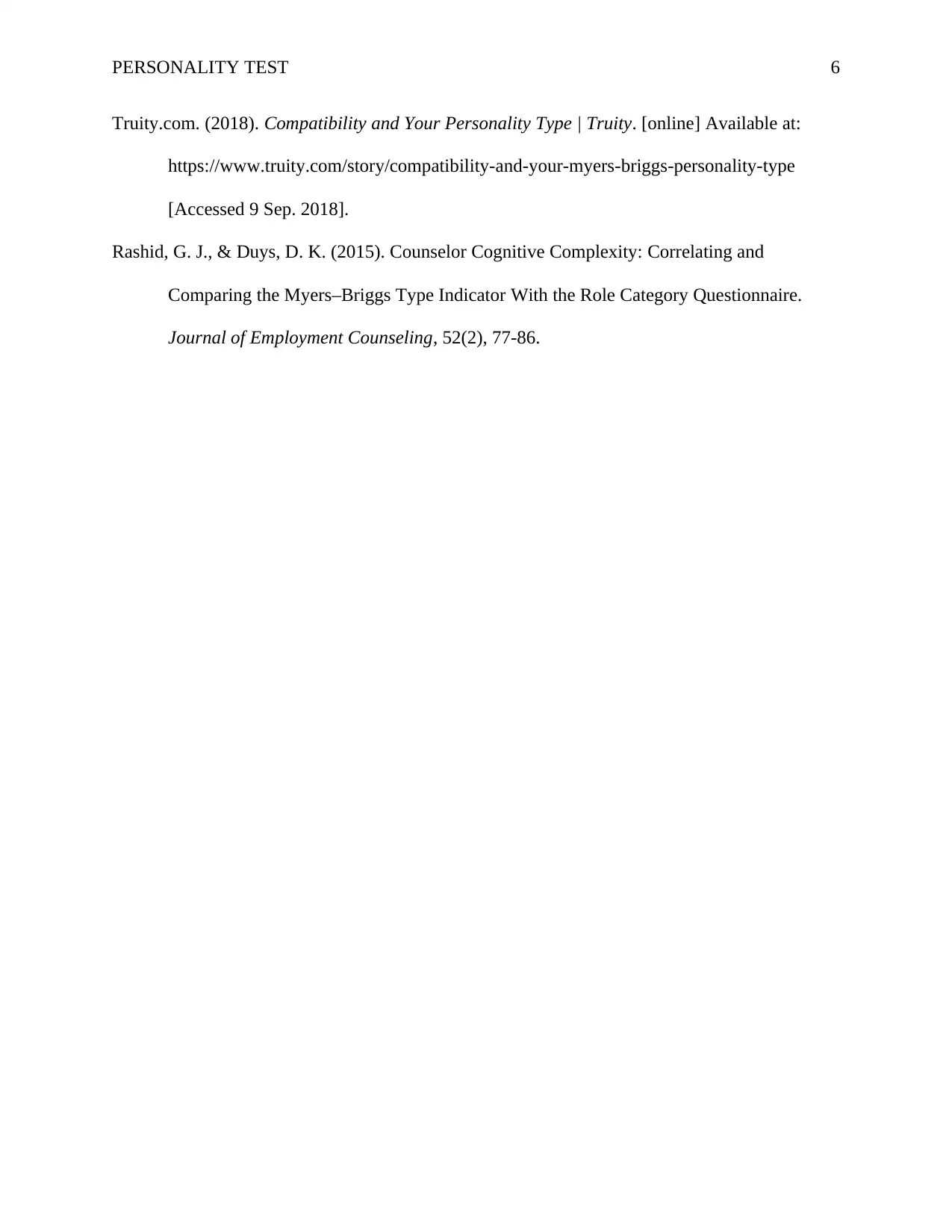MBTI Personality Assessment: Understanding Self and Others
VerifiedAdded on 2023/06/08
|6
|1183
|422
Report
AI Summary
This report discusses the Myers-Briggs Type Indicator (MBTI) personality test, its origins with Carl Jung's theories, and its application in understanding personal preferences in perception and judgment. The author identifies as an ESTJ personality type, reflecting on their strengths (leadership, rational thinking) and weaknesses (intolerance, rigidity). The report also analyzes two classmates with INFP and ISTJ personality types, detailing their characteristics, strengths, and weaknesses. Compatibility between personality types is explored, noting that ESTJs are most compatible with ESFJ, ISTJ, and ISFJ types, while being incompatible with INFP, INTP, ISFJ, and ISFP types. The report concludes by referencing various sources to support the analysis of personality types and their interpersonal dynamics. Desklib offers a variety of resources for students, including past papers and solved assignments.

Running head: PERSONALITY TEST 1
Tutorial Submission
Name
Institution
The purpose of the Myers Briggs Type Indicator (MBTI) personality test is to discover
one’s personality traits. The test was developed by Myers Briggs and her daughter following
Tutorial Submission
Name
Institution
The purpose of the Myers Briggs Type Indicator (MBTI) personality test is to discover
one’s personality traits. The test was developed by Myers Briggs and her daughter following
Paraphrase This Document
Need a fresh take? Get an instant paraphrase of this document with our AI Paraphraser

PERSONALITY TEST 2
research studies conducted by Carl Jung. The test was developed to make the theories developed
by Carl Jung applicable to people’s lives.
The personality theory purports that whereas everything seems random about your
behavior as an individual, there is an ordered system in our preference to use our perception and
judgment (Furnham, 2017). Through your perception you become aware of your surroundings,
interactions with other people, feelings of events and ideas. By relying on your judgment, you
take a decision on the actions to be taken based on the information perceived.
Knowing your personality is crucial for one to understand the self and also how to relate
with others. Understanding the self may strengthen your personal and career prospects due to the
ability of knowing how to deal with others.
Taking the personality test, I discovered I was a ESTJ type of personality. I redid the test
and the results was actually the same which gave me confidence to evaluate the results and
compare with my life experiences. ESTJ (Extraverted Sensing Thinking Judging) personality
trait involves extraverted thinking with introverted sensing (Loehlin & Martin, 2018).
From the test, I discovered that I am an extraverted person who derived energy from
interacting with others. I am self-centered and believe more in concrete rational thinking that are
result oriented. I confirmed my need to assume leadership roles in all that I do. The test revealed
my distaste for mediocrity and how people give excuses to themselves on why they did not
achieve what they set out to.
On the other hand I also discovered my weaknesses. Intolerance and rigidity were my
main drawbacks. Due to my absolute belief in myself, I disregard other people's advice and
suggestions to my detriment. I may also unknowingly hurt people without realizing due to my
research studies conducted by Carl Jung. The test was developed to make the theories developed
by Carl Jung applicable to people’s lives.
The personality theory purports that whereas everything seems random about your
behavior as an individual, there is an ordered system in our preference to use our perception and
judgment (Furnham, 2017). Through your perception you become aware of your surroundings,
interactions with other people, feelings of events and ideas. By relying on your judgment, you
take a decision on the actions to be taken based on the information perceived.
Knowing your personality is crucial for one to understand the self and also how to relate
with others. Understanding the self may strengthen your personal and career prospects due to the
ability of knowing how to deal with others.
Taking the personality test, I discovered I was a ESTJ type of personality. I redid the test
and the results was actually the same which gave me confidence to evaluate the results and
compare with my life experiences. ESTJ (Extraverted Sensing Thinking Judging) personality
trait involves extraverted thinking with introverted sensing (Loehlin & Martin, 2018).
From the test, I discovered that I am an extraverted person who derived energy from
interacting with others. I am self-centered and believe more in concrete rational thinking that are
result oriented. I confirmed my need to assume leadership roles in all that I do. The test revealed
my distaste for mediocrity and how people give excuses to themselves on why they did not
achieve what they set out to.
On the other hand I also discovered my weaknesses. Intolerance and rigidity were my
main drawbacks. Due to my absolute belief in myself, I disregard other people's advice and
suggestions to my detriment. I may also unknowingly hurt people without realizing due to my

PERSONALITY TEST 3
personality traits. I also internalize my emotions when stressed and fail to express myself
verbally (Pstypes.blogspot.com, 2018).
One of my classmates who I was working with had an INFP personality type. INFP
(Introverted Intuitive Feeling Perceiving) involves introverted feeling with extroverted intuition.
As an INFP your primary mode of experiencing the world is internally by using your feelings.
They are more concerned about their purpose in life and set standards for themselves that they
must achieve.
Their strength lies in their intuitive abilities. They continuously find the truth and
meaning underlying things in order to find value for themselves. This makes them good listeners
and may ease other people's frustrations (Rashid & Duys, 2015). They shun conflict and will do
anything to avoid it.
Their weaknesses lies in the same feelings that make them strong. Due to feelings, they
cannot be impersonal hence cannot make impersonal judgments. They are also perfectionists
which may make them create high standards for themselves and end up punishing themselves for
not achieving the high standards.
The other classmate had an ISTJ personality type. ISTJ (Introverted Sensing Thinking
Judging) involves introverted sensing with extraverted thinking (Specht, Luhmann & Geiser,
2014). An ISTJ energy is focused internally. They are generally successful in most tasks they
undertake due to their organized and methodical approach. They are model citizens who believe
in law and order.
For their strengths, ISTJ’s are extremely dependable. They honor their commitments and
can be relied upon either in personal or career life. They are both good communicators and good
personality traits. I also internalize my emotions when stressed and fail to express myself
verbally (Pstypes.blogspot.com, 2018).
One of my classmates who I was working with had an INFP personality type. INFP
(Introverted Intuitive Feeling Perceiving) involves introverted feeling with extroverted intuition.
As an INFP your primary mode of experiencing the world is internally by using your feelings.
They are more concerned about their purpose in life and set standards for themselves that they
must achieve.
Their strength lies in their intuitive abilities. They continuously find the truth and
meaning underlying things in order to find value for themselves. This makes them good listeners
and may ease other people's frustrations (Rashid & Duys, 2015). They shun conflict and will do
anything to avoid it.
Their weaknesses lies in the same feelings that make them strong. Due to feelings, they
cannot be impersonal hence cannot make impersonal judgments. They are also perfectionists
which may make them create high standards for themselves and end up punishing themselves for
not achieving the high standards.
The other classmate had an ISTJ personality type. ISTJ (Introverted Sensing Thinking
Judging) involves introverted sensing with extraverted thinking (Specht, Luhmann & Geiser,
2014). An ISTJ energy is focused internally. They are generally successful in most tasks they
undertake due to their organized and methodical approach. They are model citizens who believe
in law and order.
For their strengths, ISTJ’s are extremely dependable. They honor their commitments and
can be relied upon either in personal or career life. They are both good communicators and good
⊘ This is a preview!⊘
Do you want full access?
Subscribe today to unlock all pages.

Trusted by 1+ million students worldwide

PERSONALITY TEST 4
listeners which can make them objective during decision making. They also exhibit good money
management skills (Rashid & Duys, 2015).
ISTJ weaknesses lie in their self-righteous compasses. Their belief that they are always
right may lead them to adamantly follow the wrong path. ISTJ’s are also rigid in their nature.
They tend to follow structures rather than be spontaneous and creative.
For every personality type, there are other personality types that are compatible or
incompatible with your given personality behavior. This arises due to the case of similarities and
differences. You will be clearly compatible with individuals who have a similar worldview to
yours due to the inherent personal characteristics of their personality behaviors. You would also
be incompatible with individuals whose worldview would be different to yours due to their
personality type (Truity.com, 2018).
The personality types are compatible with my personality type would be ESFJ, ISTJ and
ISFJ according to truity. In the case of my classmates, I will be more compatible with my second
classmate than my first. ESTJ and ISTJ only differ in the extroversion and introversion part only.
As an ESTJ personality type, I am extremely incompatible with INFP, INTP, ISFJ and
ISFP. The incompatibility arises due to our different world view perspectives. I will be
incompatible with my first classmate since the personality type INFP has a different world view
from my personality.
listeners which can make them objective during decision making. They also exhibit good money
management skills (Rashid & Duys, 2015).
ISTJ weaknesses lie in their self-righteous compasses. Their belief that they are always
right may lead them to adamantly follow the wrong path. ISTJ’s are also rigid in their nature.
They tend to follow structures rather than be spontaneous and creative.
For every personality type, there are other personality types that are compatible or
incompatible with your given personality behavior. This arises due to the case of similarities and
differences. You will be clearly compatible with individuals who have a similar worldview to
yours due to the inherent personal characteristics of their personality behaviors. You would also
be incompatible with individuals whose worldview would be different to yours due to their
personality type (Truity.com, 2018).
The personality types are compatible with my personality type would be ESFJ, ISTJ and
ISFJ according to truity. In the case of my classmates, I will be more compatible with my second
classmate than my first. ESTJ and ISTJ only differ in the extroversion and introversion part only.
As an ESTJ personality type, I am extremely incompatible with INFP, INTP, ISFJ and
ISFP. The incompatibility arises due to our different world view perspectives. I will be
incompatible with my first classmate since the personality type INFP has a different world view
from my personality.
Paraphrase This Document
Need a fresh take? Get an instant paraphrase of this document with our AI Paraphraser

PERSONALITY TEST 5
References
Furnham, A. (2017). Myers-Briggs Type Indicator (MBTI). In Encyclopedia of Personality and
Individual Differences (pp. 1-4). Springer International Publishing.
Loehlin, J. C., & Martin, N. G. (2018). Personality types: A twin study. Personality and
Individual Differences, 122, 99-103.
Merrill, D. W., & Reid, R. H. (1981). Personal styles & effective performance. CRC Press.
Pstypes.blogspot.com. (2018). Incompatibility of Myers Briggs Types. [online] Available at:
http://pstypes.blogspot.com/2009/08/incompatibility-of-myers-briggs-types.html
[Accessed 9 Sep. 2018].
Specht, J., Luhmann, M., & Geiser, C. (2014). On the consistency of personality types across
adulthood: Latent profile analyses in two large-scale panel studies. Journal of Personality
and Social Psychology, 107(3), 540.
References
Furnham, A. (2017). Myers-Briggs Type Indicator (MBTI). In Encyclopedia of Personality and
Individual Differences (pp. 1-4). Springer International Publishing.
Loehlin, J. C., & Martin, N. G. (2018). Personality types: A twin study. Personality and
Individual Differences, 122, 99-103.
Merrill, D. W., & Reid, R. H. (1981). Personal styles & effective performance. CRC Press.
Pstypes.blogspot.com. (2018). Incompatibility of Myers Briggs Types. [online] Available at:
http://pstypes.blogspot.com/2009/08/incompatibility-of-myers-briggs-types.html
[Accessed 9 Sep. 2018].
Specht, J., Luhmann, M., & Geiser, C. (2014). On the consistency of personality types across
adulthood: Latent profile analyses in two large-scale panel studies. Journal of Personality
and Social Psychology, 107(3), 540.

PERSONALITY TEST 6
Truity.com. (2018). Compatibility and Your Personality Type | Truity. [online] Available at:
https://www.truity.com/story/compatibility-and-your-myers-briggs-personality-type
[Accessed 9 Sep. 2018].
Rashid, G. J., & Duys, D. K. (2015). Counselor Cognitive Complexity: Correlating and
Comparing the Myers–Briggs Type Indicator With the Role Category Questionnaire.
Journal of Employment Counseling, 52(2), 77-86.
Truity.com. (2018). Compatibility and Your Personality Type | Truity. [online] Available at:
https://www.truity.com/story/compatibility-and-your-myers-briggs-personality-type
[Accessed 9 Sep. 2018].
Rashid, G. J., & Duys, D. K. (2015). Counselor Cognitive Complexity: Correlating and
Comparing the Myers–Briggs Type Indicator With the Role Category Questionnaire.
Journal of Employment Counseling, 52(2), 77-86.
⊘ This is a preview!⊘
Do you want full access?
Subscribe today to unlock all pages.

Trusted by 1+ million students worldwide
1 out of 6
Related Documents
Your All-in-One AI-Powered Toolkit for Academic Success.
+13062052269
info@desklib.com
Available 24*7 on WhatsApp / Email
![[object Object]](/_next/static/media/star-bottom.7253800d.svg)
Unlock your academic potential
Copyright © 2020–2026 A2Z Services. All Rights Reserved. Developed and managed by ZUCOL.





